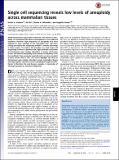| dc.contributor.author | Wu, Jie | |
| dc.contributor.author | Whittaker, Charles A. | |
| dc.contributor.author | Knouse, Kristin Ann | |
| dc.contributor.author | Amon, Angelika B | |
| dc.date.accessioned | 2015-04-01T17:37:43Z | |
| dc.date.available | 2015-04-01T17:37:43Z | |
| dc.date.issued | 2014-09 | |
| dc.date.submitted | 2014-07 | |
| dc.identifier.issn | 0027-8424 | |
| dc.identifier.issn | 1091-6490 | |
| dc.identifier.uri | http://hdl.handle.net/1721.1/96316 | |
| dc.description.abstract | Whole-chromosome copy number alterations, also known as aneuploidy, are associated with adverse consequences in most cells and organisms. However, high frequencies of aneuploidy have been reported to occur naturally in the mammalian liver and brain, fueling speculation that aneuploidy provides a selective advantage in these organs. To explore this paradox, we used single cell sequencing to obtain a genome-wide, high-resolution assessment of chromosome copy number alterations in mouse and human tissues. We find that aneuploidy occurs much less frequently in the liver and brain than previously reported and is no more prevalent in these tissues than in skin. Our results highlight the rarity of chromosome copy number alterations across mammalian tissues and argue against a positive role for aneuploidy in organ function. Cancer is therefore the only known example, in mammals, of altering karyotype for functional adaptation. | en_US |
| dc.description.sponsorship | National Institutes of Health (U.S.). Physical Sciences Oncology Center (Grant 5-U54-CA143874) | en_US |
| dc.description.sponsorship | Ellison Medical Foundation (Senior Scholar Award) | en_US |
| dc.description.sponsorship | National Cancer Institute (U.S.) (Koch Institute. Grant P30-CA14051) | en_US |
| dc.description.sponsorship | Howard Hughes Medical Institute | en_US |
| dc.description.sponsorship | Kathy and Curt Marble Cancer Research Fund | en_US |
| dc.language.iso | en_US | |
| dc.publisher | National Academy of Sciences (U.S.) | en_US |
| dc.relation.isversionof | http://dx.doi.org/10.1073/pnas.1415287111 | en_US |
| dc.rights | Article is made available in accordance with the publisher's policy and may be subject to US copyright law. Please refer to the publisher's site for terms of use. | en_US |
| dc.source | National Academy of Sciences (U.S.) | en_US |
| dc.title | Single cell sequencing reveals low levels of aneuploidy across mammalian tissues | en_US |
| dc.type | Article | en_US |
| dc.identifier.citation | Knouse, Kristin A., Jie Wu, Charles A. Whittaker, and Angelika Amon. “Single Cell Sequencing Reveals Low Levels of Aneuploidy Across Mammalian Tissues.” Proceedings of the National Academy of Sciences 111, no. 37 (September 2, 2014): 13409–13414. | en_US |
| dc.contributor.department | Harvard University--MIT Division of Health Sciences and Technology | en_US |
| dc.contributor.department | Massachusetts Institute of Technology. Department of Biology | en_US |
| dc.contributor.department | Koch Institute for Integrative Cancer Research at MIT | en_US |
| dc.contributor.mitauthor | Knouse, Kristin Ann | en_US |
| dc.contributor.mitauthor | Wu, Jie | en_US |
| dc.contributor.mitauthor | Whittaker, Charles A. | en_US |
| dc.contributor.mitauthor | Amon, Angelika B. | en_US |
| dc.relation.journal | Proceedings of the National Academy of Sciences of the United States of America | en_US |
| dc.eprint.version | Final published version | en_US |
| dc.type.uri | http://purl.org/eprint/type/JournalArticle | en_US |
| eprint.status | http://purl.org/eprint/status/PeerReviewed | en_US |
| dspace.orderedauthors | Knouse, Kristin A.; Wu, Jie; Whittaker, Charles A.; Amon, Angelika | en_US |
| dc.identifier.orcid | https://orcid.org/0000-0002-0989-8115 | |
| dc.identifier.orcid | https://orcid.org/0000-0001-9837-0314 | |
| dc.identifier.orcid | https://orcid.org/0000-0003-0649-7428 | |
| mit.license | PUBLISHER_POLICY | en_US |
| mit.metadata.status | Complete | |
